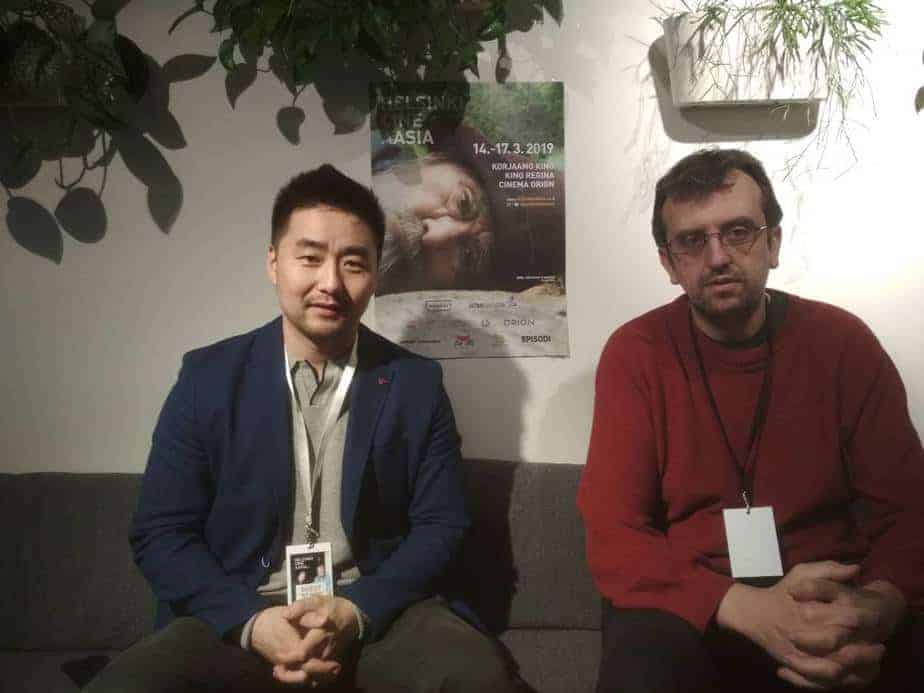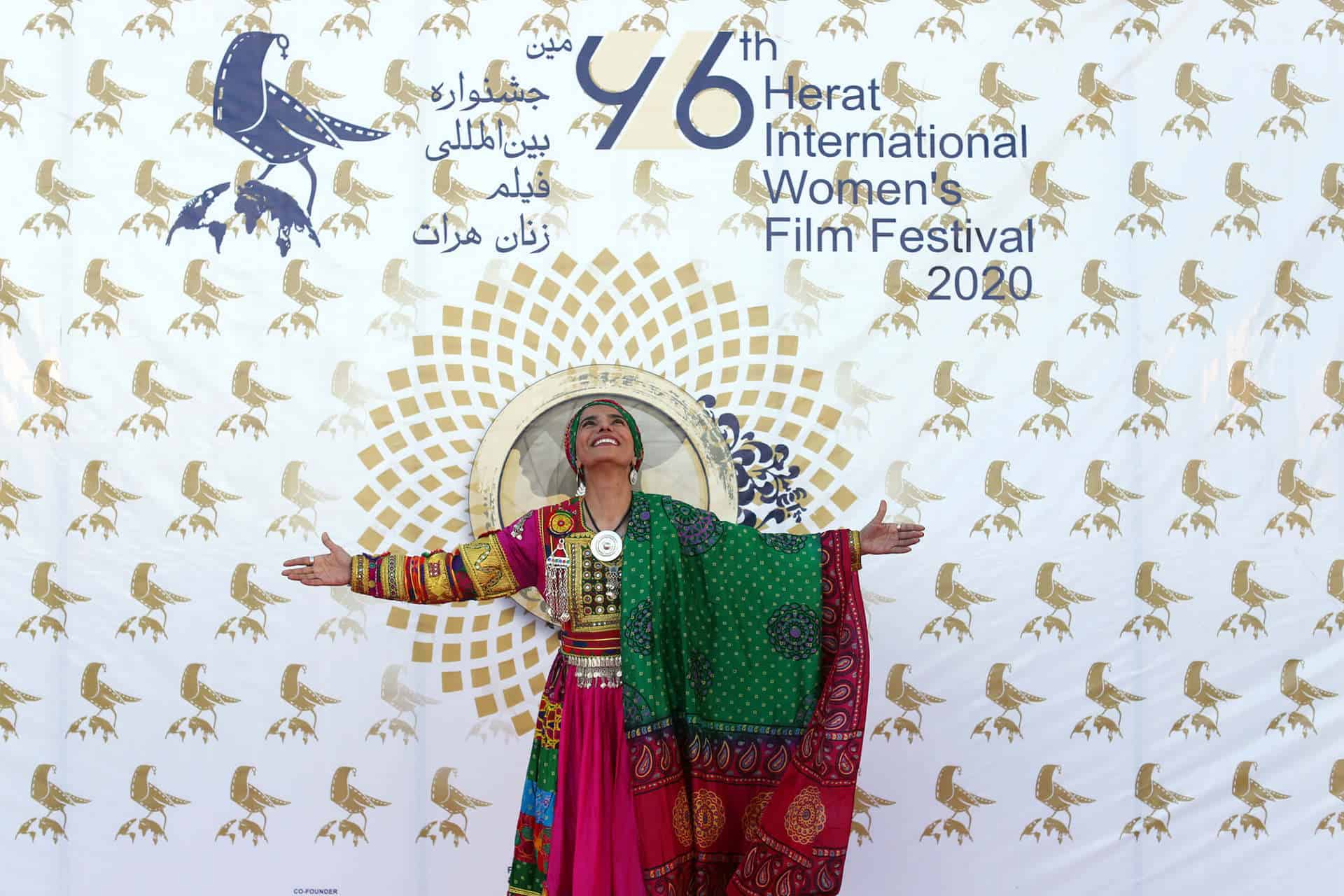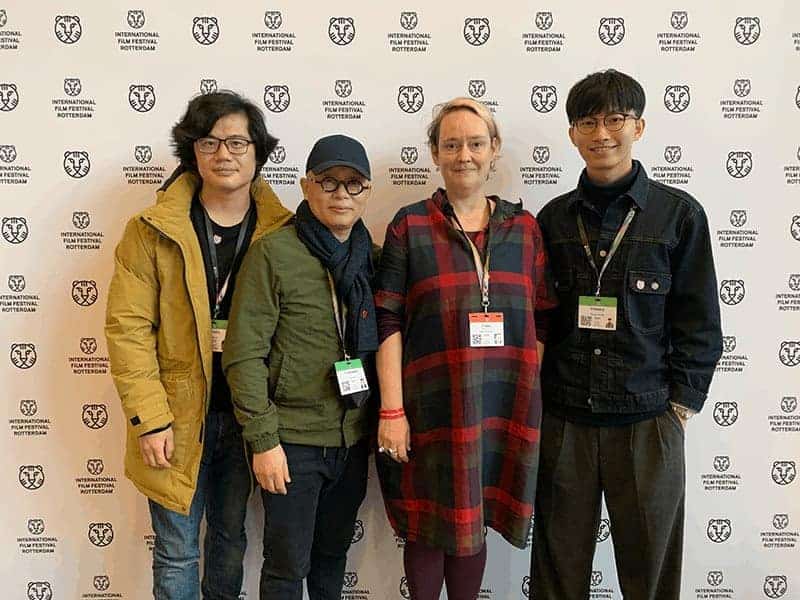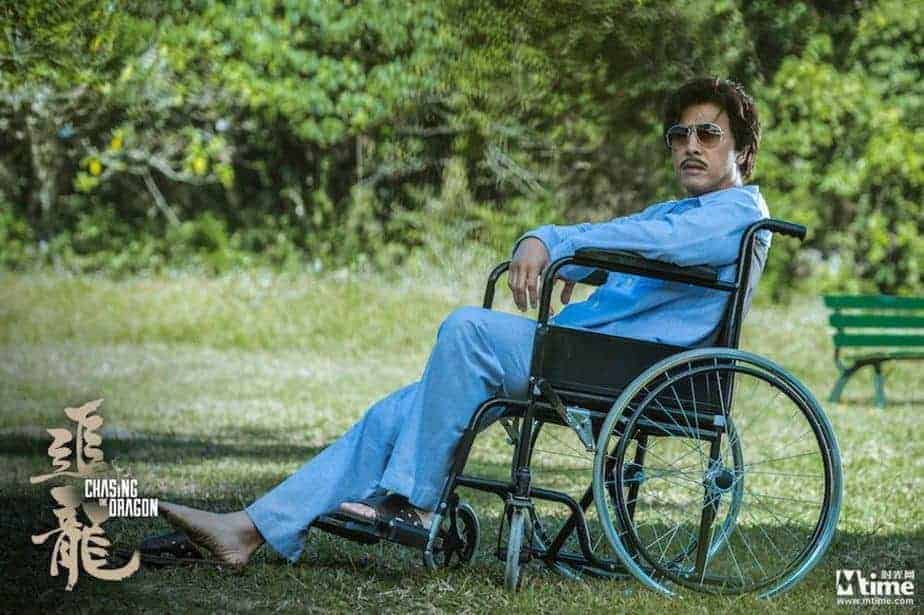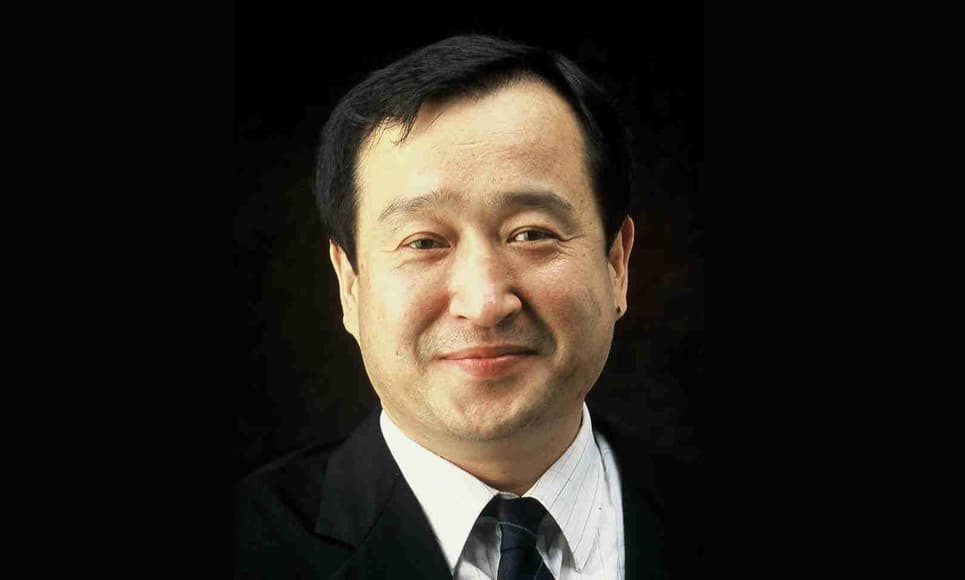Bat-Amgalan Lkhagvajav directed “They Sing Up on the Hill” with the British filmmaker Ian Allardyce. The two have known each other since 2002 when they worked on the first reality TV talent show in Mongolia. “They Sing Up On The Hill” is Lkhagvajav's first full-length feature film. He has previously directed short films, including “The Red Forest” (2005), “An Encounter in the Woods” (2009) and “The Wonderful Flight” (2015).
On the occasion of “They Sing Up on the Hill” screening at Cine Aasia, we speak with him about his career, the movie, Mongolia, working with non-actors, music and many other topics

Can you give us some details about the path that led you to become a director?
I graduated from some kind of technical high school, and my field was electronics. I won a bronze medal for my performance, and this allowed me to attend any school I wanted since the government pays two years tuition. But after the two years, I had to pay for my own tuition (laughter), so I joined a media company in order to get the funds, and there I dealt with media production. I had no clue about these things, but I stayed in that company for 5 years, and this company actually paid the rest of the 2 years tuition and I finished the school. I learned a lot there, and also, during this time, I met Ian Allardyce, who came to Mongolia after graduation from the UK. He joined the company, and the two of us started everything together, started making films, although we did not know much about cinema. Eventually, I decided to stay in this business, and I am very happy about this decision.
In the movie, Ian Allardyce is credited as co-director. What is his role exactly in the film?
It is like a “professional marriage” (laughter). We understand each other so well, despite the fact that we come from completely different cultures, him being British and me Mongolian. We studied and learnt everything from the beginning together, and that is why this understanding came to be. We get some ideas and develop them together, but when we are making a film in Mongolia, I have to work with the actors and organize everything, and he is the cinematographer and I direct. Also, since it is a Mongolian film, I had to edit it mostly and then he gives his points, we work like that.
Was it difficult editing your film? Some directors tend to think that it is kind of like correcting yourself and find it really difficult.
It is, yes. I had to do it, and some filmmaker friends said that I should not do it, because you get blind and cannot see your own errors. I kind of agree but then you are the one who understands most your own film, so I would say 50-50.
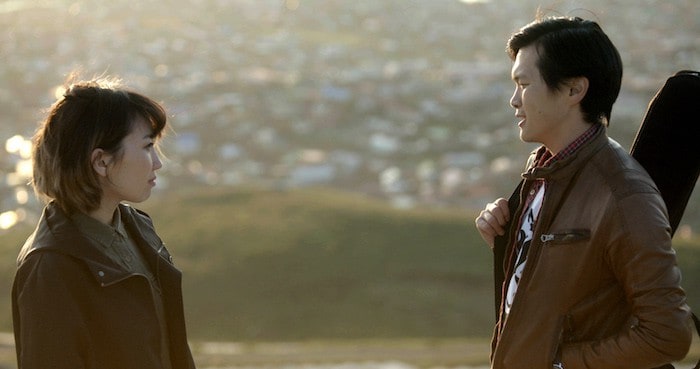
But if you had the money, would you hire an editor?
Of course, it all depends on money.
Has the film screened in Mongolia?
Not yet, but it is going to be screened in every cinema on March 29, and that is why I am so busy these days, dealing with the promotion of the film. And we also had to make music videos for the songs of the movie, and I am directing them also.
Do you think people will come to watch the film?
I think so, because we have a really good film festival in Mongolia, Ulaanbaatar Film Festival, which celebrated its tenth edition last year, and they chose “They Sing Up on the Hill” as their opening film. So many people came to watch it and they loved it and the rumor was spread everywhere, so people are actually expecting it to be released.
I felt that one of the main themes of the film is depression, as it is the feeling the protagonist experiences, particularly because he does not know what to do with his future. Can you elaborate on this?
I think in life, it does not matter who you are or where you live, you can still experience that kind of depression, deriving from a sense of being lost, not knowing what you are doing. I also faced that feeling, the question of “What am I doing?”, and in that aspect, I kind of identify with the protagonist. In our film, the antagonist of the protagonist is himself, he is fighting with himself.
We also tried to portray how the Mongolians live in a contemporary lifestyle, what they are thinking, what they are dreaming, how they survive. We wanted to show this to international audiences, in order to change the stereotypes of Mongolian films, since, usually, films of the country are about nomadic people, the horses etc. We want to show how the contemporary Mongolian people live, especially young ones.
We also wanted to show the perspective of the artist, since we are artists, and sometimes making art in Mongolia is hard, because the population is small and there is no market, and making money by art is really difficult.
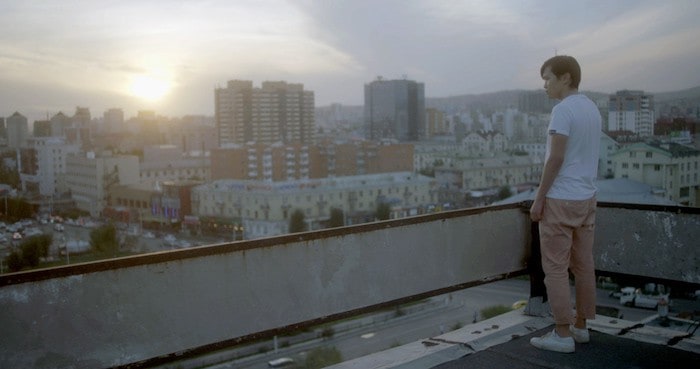
So apart from Ulaanbaatar, are there any other urban centers in Mongolia?
There are three other major cities, but the population is about 2-3 hundred thousand people for each. The rest of Mongolian people live in the countryside, about 2 million that is, while a bit more than 1 million inhabit the capital.
And how many screening rooms are there in the country?
I think 17 or 18.
Gegee's boss in the film, flirts with her aggressively, using his position. Is that something common in Mongolia?
I think it is common everywhere, sexual harassment. We tried to present a number of issues in the film, through some minor scenes in , which, if you notice, you can realize there is a message there. For example about the particular boss and also the local officials meeting with foreign officials and trying to do some shady work.
So, you think there is much corruption in Mongolia's public sector at the moment?
That is the big problem that is holding back Mongolian's progress.
What is the situation with censorship in the country?
If the film is really against politicians or the ruling party, they censor it. A few years ago, someone made a film like that and the leading party just shut the film down. So, nowadays, no one makes that kind of films, but I am going to try eventually, although I am not sure how they will react.
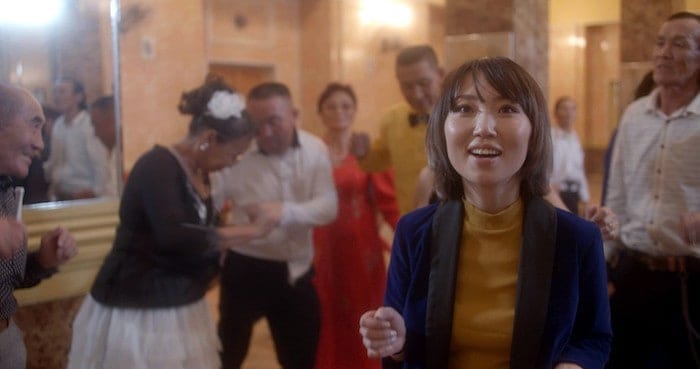
Can you tell me a bit about the songs in the film?
Both of our protagonists, Dulguun Bayasgalan as Od and Nomin-Erdene Munkhbat as Gegee are musicians. Dulguun is known as Magnolian and Nomin-Erdene as NMN. Magnolian mostly plays folk-rock songs and he is a singer-songwriter, with most of his songs being in English. When were looking for the actress, he suggested to work with NMN, who is a rapper and her songs are really good and also writes her own lyrics, and I agreed with him. She accepted and she wrote all the lyrics for the songs in the film and Magnolian all the music. It was a really good collaboration with all four of us, since we told them what kind of music we want and which lyrics should match each part of the film, the message and feeling we wanted to communicate. For example, Gegee in Mongolian means brightness or light while Od means star, and we also used this connection in one of the songs of the film. They made six songs for us, all of which are great.
Will you be releasing the soundtrack of the film?
Two songs are actually released on YouTube. I shot the video of one of them and released just before I left Mongolia, (the interview was conducted March 17). In two days, it had more than 30,000 clicks.
And the second one is this
And what about the song the mother sings?
It is a long song. We have this tradition of long songs in Mongolia, where the lyrics talk about life in a philosophical way and some stories, too. Some of them are written by a famous artist three of four hundred years ago and some are of unknown origin, they just came from the people. In our film, the protagonist is supposed to be inspired by the long song Gegee's mother sings, but as I was doing research, I could not find a suitable one. Therefore, I decided to write the lyrics of my own long song. The mother in the film is actually a famous long songs singer and I just asked her if she could make the lyrics to fit in a song, and she did so, the result was awesome, and so I included it in the film. Later on, when I met some friends I made a joke about this thing, that there are only two artists who ever wrote long songs, one 400 hundred years ago and now me (laughter).
Was it difficult working with non-actors?
In the beginning, it was quite of difficult, but they had some experience of being in front of a camera for music videos, interviews etc. They are really good, though. In addition, my difference is that I always choose non-professional actors, because in Mongolia the acting schools were established during the socialist times and the teachers are still there. Their teachings are based on theatre acting and we really do not get that kind of acting in a film. It is really difficult to “break” the actors who have graduated from those schools. Non-actors on the other hand, if you train them, they can play and can live the film, they perform more naturally.
But you have to be very close to them, giving them instruction very frequently.
Yes, my strategy is not to show them, but to tell them, “Can you feel this situation? If this thing happened to you, what would your reaction be? Feel this reaction, feel that moment and just act as the person you are”. They understand that. Our actors and actresses are really natural, I love them.
During the movie, there is a kind of a heavy metal band that is playing a really strange song. Who are they?
Their name is NISVANIS. They are one of the oldest and coolest bands in Mongolia. Their name is the opposite term of Nirvana, nisvanis is the negative one. Regarding the various live performances in the film, we just went around to some places there was one, and we just popped in and we told them we are shooting a film with the crowd and then we just went in and shot. (laughter)
How is the music scene in Ulaanbaatar?
It is big, and there is much audience actually, since nowadays a lot of people know about international music and movies. Actually, sometimes, when I talk to young people I am embarrassed because I do not know whom they are talking about. Because, when I was young I was so busy working and these days, young people have the time to watch films and listen to music.
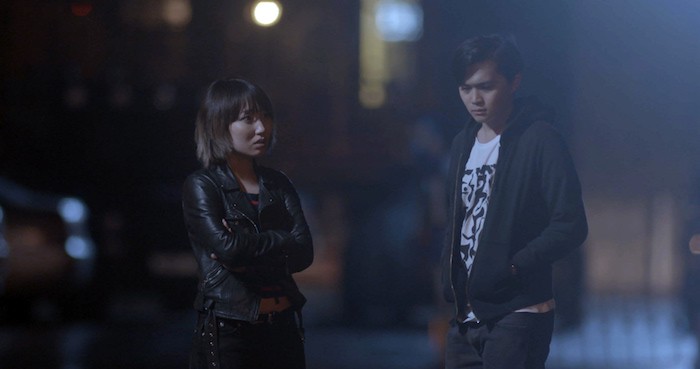
There is a scene in the film, where the band is playing in a pub, and one man from the audience demands a song, which causes Od to leave eventually. Is that a comment regarding the relationship between artists and their fans?
I think this happens sometimes, particularly if someone in the audience is drunk. But singers, artists have their own pride and they cannot accept things like that. As an artist, I think it is ok to be famous but it is not for living in Mongolia because the population is small and is difficult to make a living like that. In cinema, about 300.000 people can see a popular film, and this will allow it to make some money, but it is still limited. This kind of audience will generate about 100.000 euros, and half of that go to the cinema. From the sum left, you can actually use about 25.000 to make a next film (laughter) which is just too little.
How is the situation with the Mongolian film industry at the moment?
Last year, they were released somewhere between 60 and 70 movies in the country, which, in essence, means that every week there is a new film, from a different director for that matter.
Do you receive any funding from the government?
No, there are some funds for historical documentaries or children movies, but not much money.
So, where do the money for all those movies come from, since you mentioned that the audience covers just a small part of expenses?
Producers raise their money on their own, from local companies or sponsors or pay from their pocket. In the old days, there were some filmmakers who were set on shooting their film and mortgaged their houses to take a loan to make their movie and then went bankrupt. That happened a lot, but nowadays this does not happen. We actually took a loan also for this film.
Are you working on anything new?
I just finished a new script but I want to change it and I want to submit to the 2019 Locarno Film Lab. Because for 2018 to 2020, they highlight Mongolian film and also SE Asia. There is kind of a competition and if the script is good it can be developed through the lab


